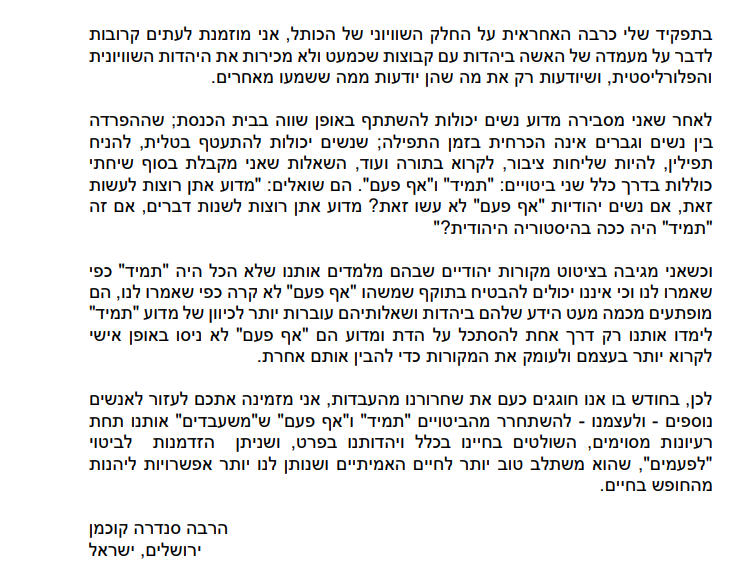By Rabbi Sandra Kochmann
Note: This blog post was featured as part of our #HeshbonHodesh: Nisan monthly newsletter.
In my work as the rabbi in charge of the egalitarian side of the Kotel, I am often invited to speak about the role of women in Judaism with groups not familiar with egalitarian and pluralistic Judaism, who only know what they know from what they heard from others. After explaining why women can participate equally in the synagogue; that the separation between men and women is not necessary during prayer; that women can wear tallit, tefillin, officiate, read the Torah and much more, the questions that I receive at the end of my talk generally include two words: "always" and "never." They ask: "Why do you want to do that, if Jewish women never did? Why do you want to change things, if it was always like this in Jewish history?"
And when I respond by citing Jewish sources where we are taught that not everything was "always" as they told us and that we cannot firmly assure that something "never" happened as they told us, they are surprised with how little is their own knowledge about Judaism. Then their questions become more about why they "always" were taught about only one way of looking at religion and why they were "never" exposed to more Jewish sources in order to understand them differently.
That is why, in the month in which we celebrate our liberation from slavery as a people, I invite you to help more people - and ourselves - to become free from the "always" and the "never" that "enslave" us to certain ideas, governing our lives in general and our Judaism in particular. In this process, I encourage all of us to give a new opportunity to the "sometimes," that are more real, that give us more options and that allow us to enjoy life with greater freedom.
En mi trabajo como rabina a cargo de la parte igualitaria del Kotel, muchas veces me invitan a hablar sobre el rol de la mujer en el judaísmo con grupos poco o nada familiarizados con el judaísmo igualitario y pluralista, que solo saben lo que saben por lo que escucharon de otros. Luego de explicarles por qué las mujeres podemos participar de manera igualitaria en la sinagoga; que no es necesaria la separación entre hombres y mujeres durante el rezo; que las mujeres podemos usar talit, tefilín, oficiar, leer la Torá y otros temas, las preguntas que recibo al final de mi charla generalmente incluyen dos palabras: "siempre" y "nunca". Ellos preguntan: "¿Por qué quieren hacer eso, si nunca las mujeres judías lo hicieron? ¿Por qué quieren cambiar las cosas, si siempre fue así en la historia judía?".
Y cuando les respondo citando fuentes judías donde se nos enseña que no todo fue "siempre" como nos contaron y que no podemos asegurar firmemente que algo "nunca" ocurrió así como nos dijeron, quedan sorprendidos con el poco conocimiento propio que tienen sobre el judaísmo. Entonces, sus preguntas pasan a ser más sobre el por qué "siempre" les enseñaron una sola forma de ver la religión y por qué ellos "nunca" se plantearon personalmente leer más y mejor las fuentes para poder entenderlas de manera diferente.
Por eso, en el mes en el que celebramos nuestra liberación de la esclavitud como pueblo, los invito a que ayudemos a más personas –y a nosotros mismos- a liberarnos de los "siempre" y de los "nunca" que nos "esclavizan" bajo determinadas ideas, rigiendo nuestras vidas en general y nuestro judaísmo en particular. En ese proceso, los aliento a que demos más oportunidad a los "a veces", que son más reales, que nos dan más opciones y que nos permiten disfrutar de la vida con mayor libertad.
Rabina Sandra Kochmann
Jerusalem, Israel

Read the Other Blog Posts in This Series:
Rabbi Mark J. Bisman: Freedom from the Perspective of Retirement
Rabbi Eliav Bock: Connecting with the Divine in the Outdoors
Rabbi Mario Rojzman: The Ancient Jewish Vaccine Against Loneliness
Rabbi Ervin Birnbaum: The Story of the Exodus Ship
Rabbi Danielle Upbin: צא ולמד - Our Body as Teacher: A Spiritual Journey Through the Hebrew Letters
Rabbi Sandra Kochmann (Seminario, 2000) is the first female rabbi to serve in Brazil. She is now the Masorti Olami coordinator for weddings and conversions.
